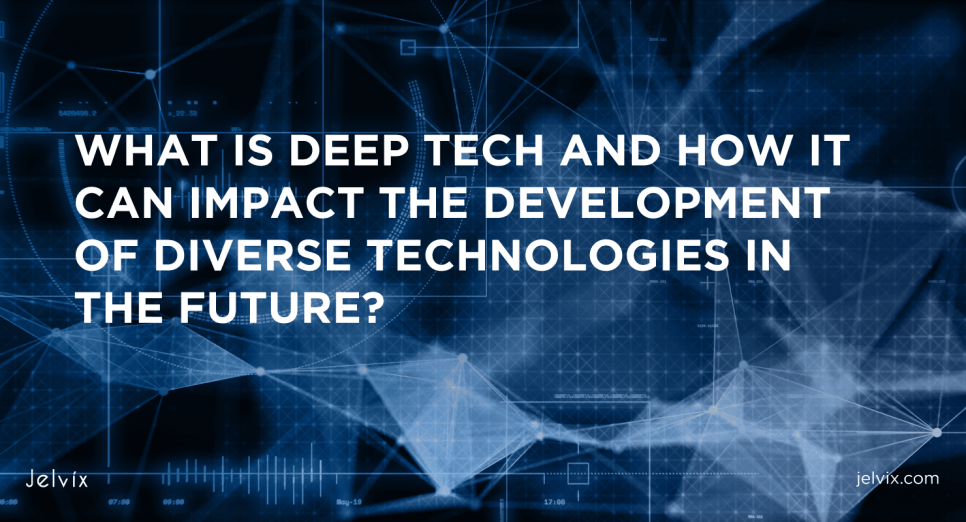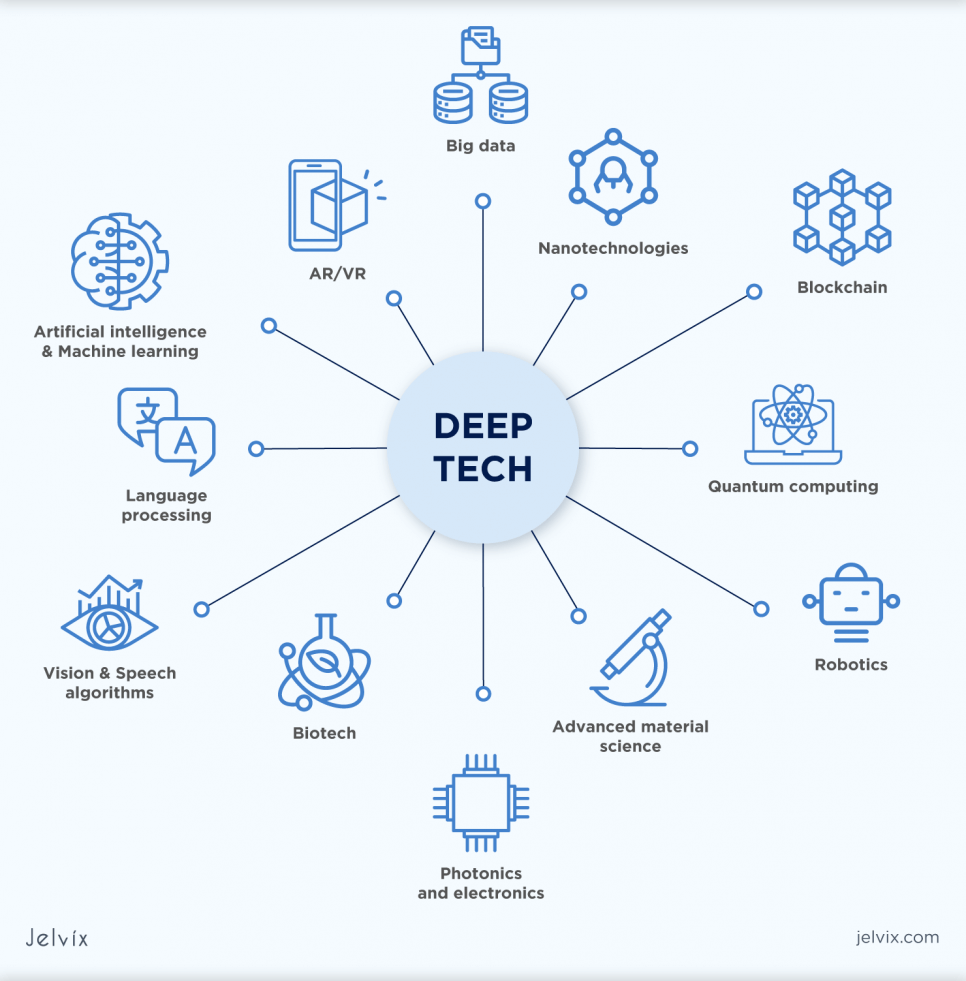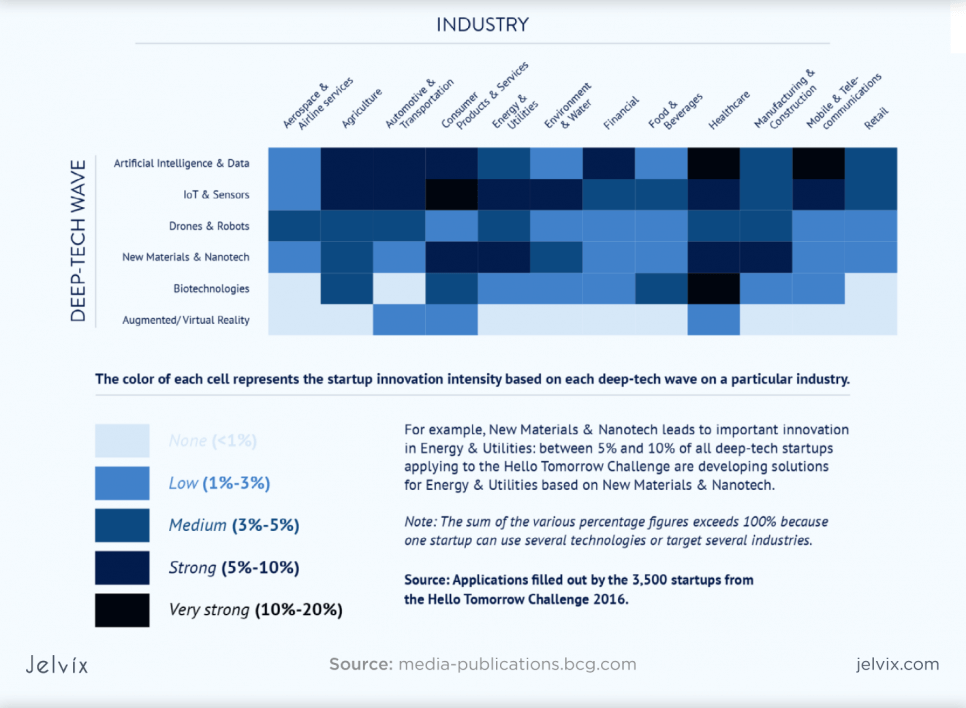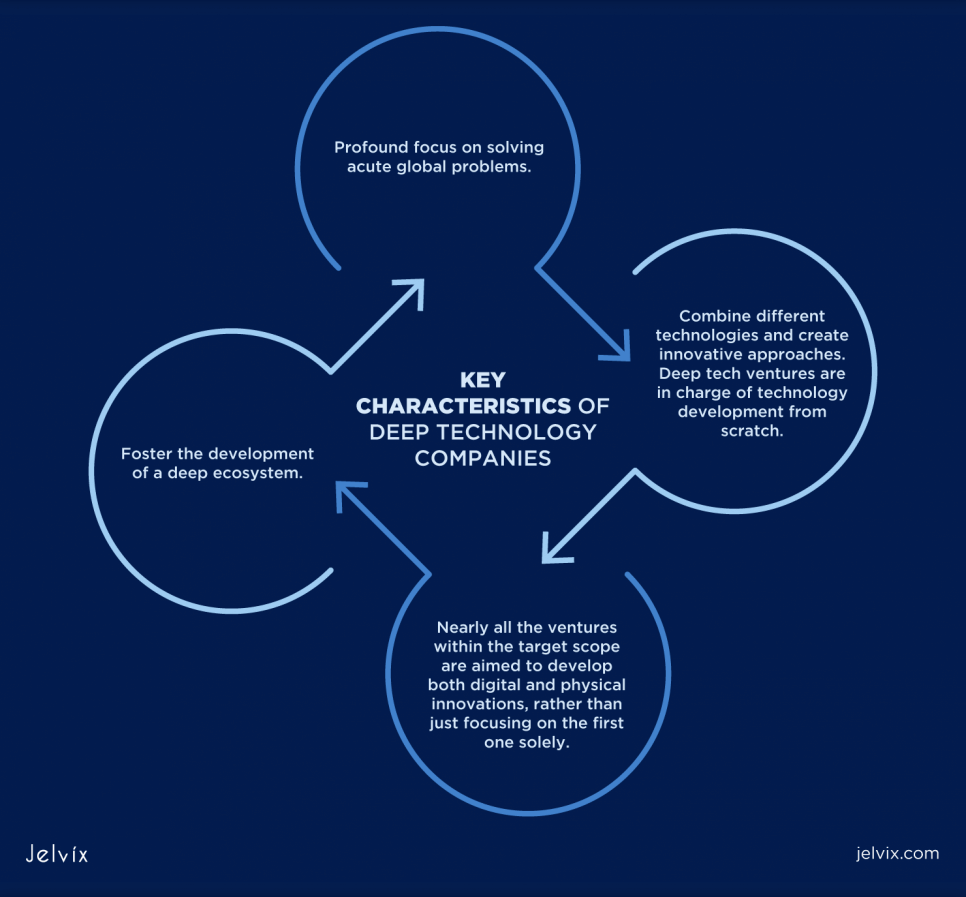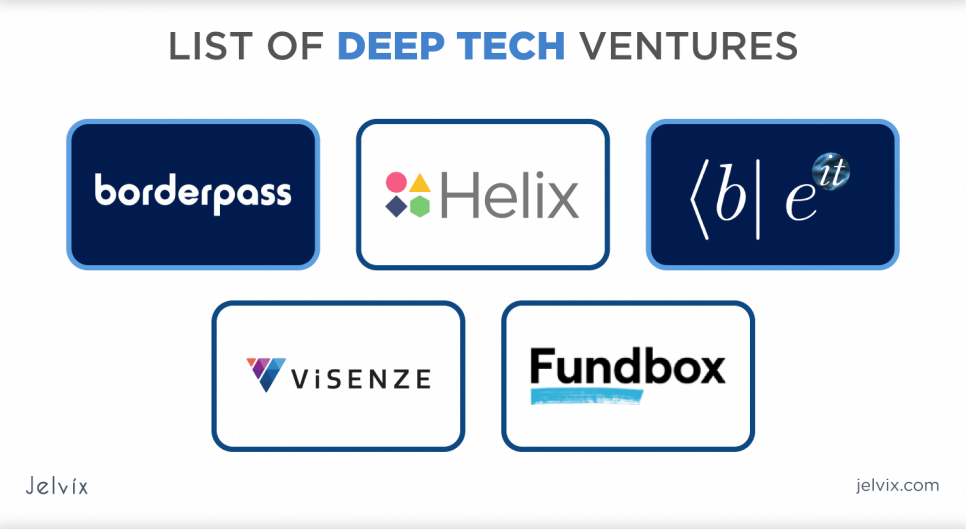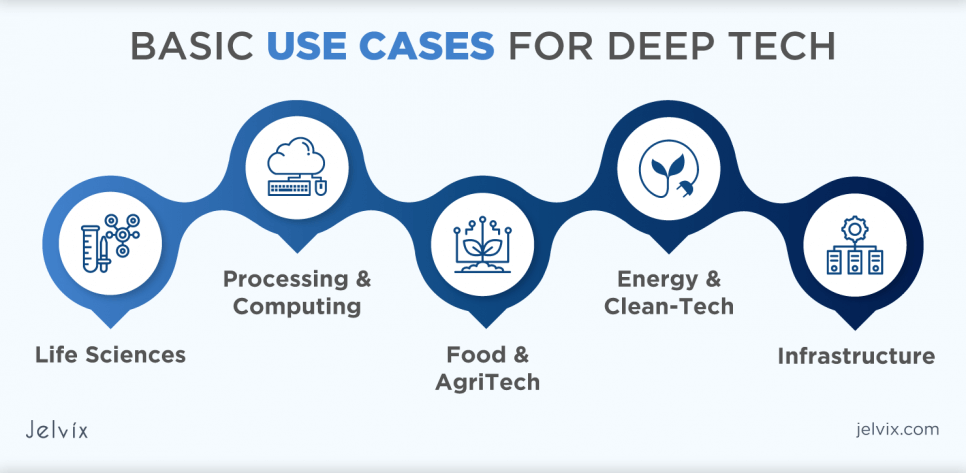With more and more cutting-edge innovations evolving, many enterprises today have shifted their focus to addressing various societal and environmental problems at the world level. This process immediately led to the emergence of a brand new tech-based industry with vast potential – deep tech.
For many large enterprises and recently launched startups, deep tech is a lucrative and prospective field that can result in a revolutionary breakthrough within a certain industry focus. According to the BCG research, the overall investment in deep tech starting from 2015 increased by 300% to more than $60 million in 2020.
Analyzing the funding sources in deep tech, we see that they include a vast number of companies and enterprises: traditional information and communications technology (ICT) and biopharma companies, as well as large multi-focus mainstream corporations, such as Google, Amazon, Bayer, Commonwealth Fusion Systems, and many more.
In this article, Jelvix experts explain the phenomenon of deep tech, the core features of deep tech companies, and basic use cases of deep tech across different scopes. Along with that, we’ll discuss the most notable challenges of deep tech, its future development potential, and the most common questions regarding deep technologies today.
What is Deep Tech?
Deep tech, or deep technology, is a term used to describe technologically based companies or enterprises that develop innovative solutions and approaches to addressing major societal challenges such as climate change, food production, chronic diseases, waste recycling, and more.
So, this industry is not directly focused on developing end-user products or services; instead, it is concentrated on resolving significant issues. As for the technologies, deep tech involves the vast utilization of advanced solutions, including:
- Artificial intelligence & Machine learning
- AR/VR
- Big data
- Nanotechnologies
- Blockchain
- Quantum computing
- Robotics
- Advanced material science
- Photonics and electronics
- Biotech
- Vision & Speech algorithms
- Language processing
While deep tech focuses on addressing large-scale societal challenges, hardtech innovations specifically refer to physical systems and tangible products that bring these breakthroughs to life. Hardtech companies create hardware, materials, and engineering solutions that push the boundaries of what’s possible.
Some of the primary challenges of deep tech companies are durable research, in-depth development, and considerable capital investments before the project’s successful commercialization. However, deep tech’s innovative deliverables are often radical and can either create new markets or disrupt existing ones, thus significantly impacting everyday life.
Deep Technology Innovations Intensity in Each Industry: Overview
Deep tech innovations have been widely applied and improved under the demands of various megatrends (i.e., demographic shifts, global climate change, resource scarcity, and more) and notable scientific progress across different industries.
According to the BCG report, one of the leading universal innovations that have been extensively used in most industries is AI and Big Data. This deep tech wave has heavily contributed to innovations in the Healthcare, and Mobile & Telecommunications industries.
On the contrary, Augmented/Virtual Reality (AR/VR) is the least intensively used technology, with comparatively low inputs to the Automotive & Transportation, Consumer Products & Services, and Healthcare industries.
What Makes Deep Tech So Different?
Once you’ve discovered the deep tech meaning and its basic areas of application, it’s now time to learn what gives this field such specific game-changing characteristics.
First, deep tech startups typically need significant investments over a longer term and profound research of a particular problem. The commercial success of this type of project will also take more time to achieve due to the disruptive technologies it creates, unlike in general-tech and high-tech scopes.
The good news here is the juicy outcomes the deep tech startups can bring as a result. The innovative nature of the developed products can not only set brand new trends for the target industries, but they’re also challenging for competitors to rival. Moreover, deep tech solutions can easily undermine the relevancy of other products or businesses, which makes them extremely attractive to large corporations.
A decent example of this phenomenon that you’ve definitely come across is a blockchain for fintech. Basically, it features a higher level of security for various transactions across the globe, making the banking process faster, easier, and completely secure for the average consumer.
Therefore, blockchain can easily blow up the outdated business model of uncompetitive banks with poor performance and high fees, while enhancing the competitiveness of those institutions that are intensively adopting it to enhance the current system performance.
Basic Elements of Deep Tech Companies
In most cases, deep tech companies are ventures that already have their household names, have been in public attention for a while, or are deeply focused on specific files that few people can describe. These organizations consistently involve various tech talents, scientists, engineers, and entrepreneurs to solve various large-scale problems.
While focusing on a particular problem that no existing technologies can resolve, deep tech investors put money into brand-new tech solutions that have a notable potential to make a breakthrough in the industry or across several industries at once.
What makes deep technology ventures stand out from other companies? Here’s a brief overview of their key characteristics:
- Profound focus on solving acute global problems. Deep tech companies are mainly targeted at resolving large-scale, urgent matters to prevent society from losing out on the benefits of innovations offered by the industry.
- Combination of different technologies and creation of innovative approaches. While high-tech and general tech enterprises utilize ready-made solutions, deep tech ventures are in charge of technology development from scratch. Additionally, they often combine top-notch, innovative cross-industry technologies to solve problems. According to BCG, 96% of deep tech ventures use at least two technologies.
- Developing solutions for resolving physical challenges.
- Nearly all the ventures within the target scope aim to develop digital and physical innovations rather than just focusing solely on the first one. Thus, they leverage technologies such as AI and machine learning to enhance the development of different industries like chemistry, agriculture, and others.
- Fostering the development of a deep ecosystem. Due to the complexity of this industry development, deep tech ventures together make a large and complex system that requires considerable investments and resource input.
Though representing a small minority of startups, deep tech companies have a comparatively larger and more notable impact on various industries today. Their input is often described as futuristic and practical, with the potential to resolve big and complex societal problems across different scopes.
What Are the Examples of Deep Tech Enterprises & Startups?
While the characteristics of deep tech companies might seem a bit challenging to understand at first, it’s much easier to learn the potential of deep tech startups from real-world examples. Below you’ll find a list of deep tech ventures with a diverse industry focus.
- BorderPass (Malaysia) – an intelligent management project that leverages biometric data to enable automated and secure solutions for airports (check-in, boarding, etc). This venture has already been implemented across the market and is currently at the scaling-up stage.
- ViSenze (Singapore) – the world’s smartest product discovery platform that empowers visual search and image processing tools for online retailers across diverse fields. So far, the startup has raised over $34 million in Series C (2019) and has intensively invested in partnership development with smartphone makers, including Samsung, LG, and Huawei.
- Beit (EU) – a quantum computing software company that is targeted at developing and implementing novel quantum algorithms to create versatile and powerful software solutions for quantum computers.
- Helix (US) – a population genomics company with a core focus on empowering every person to improve their health outcomes and life through DNA. In other words, it enables healthcare organizations to accelerate the integration of genomic data into patient care and public health decision-making.
- Fundbox (US) – an AI-powered financial platform for small and mid-sized businesses that offer fast and intuitive access to business credit up to $150,000. Currently, Fundbox has enabled over 70,000 enterprises to launch successful and profitable businesses across a wide range of industries.
These are only a few examples of deep data companies that have already contributed to various industries or have a strong potential to change their development in the near future. Nevertheless, the application fields of deep technologies are not solely limited to the ones mentioned in the deep tech examples above.
Keep on reading to define the major fields of deep tech implementation!
Basic Use Cases for Deep Tech
Previously, you have discovered the definition of deep technology, the main features of deep tech companies, and some real-world examples. Now, let’s take a closer look at the major application options of deep tech across the five key industries.
Life Sciences
A 2020 research by Boston Consulting Group found that every second deep tech startup is focused on the healthcare market. This impacted the development of a broad spectrum of fields, which include (but are not limited to):
- Cancer treatment
- AI diagnosis
- Consistent health indicators tracking
- Patient health information management
- Personalized treatment
All these advancements have already improved precision medicine, allowing doctors and scientists to create personalized, new tailor-made treatments based on health data and even simulate the treatment progress for faster and more efficient patient recovery.
Processing & Computing
Since the first computer was invented in 1946, the design and functionality of modern devices have undergone significant changes. Today, they can handle all the world’s current needs, from ordering food online to a deep analysis of big data. With deep tech, however, computers will be able to address more significant problems and areas.
One such solution, for instance, is quantum computing – a rapidly-emerging technology that harnesses the laws of quantum mechanics to solve problems too complex for classical computers (IBM). Simply put, that’s a powerful computing and processing solution that enables conducting a variety of complex calculations in a shorter time.
Food & AgriTech
With the current world’s population almost reaching 8 billion, the question of food insecurity becomes more acute these days. However, deep tech solutions have all the potential to significantly enhance farming practices by introducing more sustainable methods of food production.
For instance, promising startups within the target industry are now widely exploiting big data, blockchain, and biotech solutions to empower farming systems with predictive capabilities. Thus, farmers can analyze the soils, define the best crops for certain areas, and predict the yields and harvests with better efficiency for their businesses and society’s welfare.
Energy & Clean-Tech
Another essential area that requires optimization due to the increasing demand is the energy market. Deep tech companies can contribute to the research of the development of renewable sources, including hydropower, wind, and solar energy generation.
As an example, some of the most notable challenges which are currently in progress are battery advancement and cloud solutions implementation.
Infrastructure
Another emerging challenge for deep tech, which is caused by an increasing population, is infrastructure development, maintenance, and optimization. This scope includes transport networks, housing, sewers, power plants and supplies, and other subjects of humanity’s good. Similarly, this also covers the aspect of reducing the environmental impact caused by disposable culture and consumerism.
What is more, the latest G20 insights highlight the increasing number of global pandemics in the upcoming years, which only highlights the importance of developing secure and sustainable infrastructure without sacrificing the quality of human life.
Within the target area, deep tech companies are concerned about collaborating with urban planners and ecologists to launch innovative technologies that can meet this challenge.
What are the Challenges for Deep Tech Today & in the Future?
The challenges of deep tech companies also differ from those of regular tech startups. As a rule, a large research and development cycle makes their projects more time and resource-consuming to set up.
Additionally, due to the considerable complexity of the addressed challenges, it becomes more difficult to secure the investments and showcase the potential of a certain idea that is to be explored. This vicious circle creates many problems in both the studying and development stages, which may end up in failure.
Scale your business quickly and operate with a higher impact. Jelvix Machine Learning development services and Artificial Intelligence development help companies drive performance, automate tasks, and increase revenue.
Apart from funding difficulties and considerable resources required to launch the project development, the other challenges deep tech ventures need to overcome include the following:
- Difficulties in scaling up – mainly due to the limited budget and a vast number of development resources required;
- The need to push science boundaries – unlike the standard tech-based companies, deep tech enterprises are targeted at making a revolutionary breakthrough while addressing acute, large-scale challenges and issues;
- The need for reimagination – finding the best model to reshape processes or solve particular problems.
Despite these challenges, deep tech solutions still have an excellent perspective for future growth, with billions of investments raised for a variety of projects proving that. Advanced tech projects like sustainable batteries, surgical robots, satellite Internet access, agile robots, AI-powered platforms, and others are expected to make powerful revolutionary breakthroughs across many industries, thus, significantly enhancing mankind’s life quality.
Conclusion
As you can see, more and more mainstream companies and institutions are recognizing that solutions to big problems and the future of innovation lie in deep tech. That is why various deep-channel technologies such as AI, blockchain, machine learning, robotics, and many others have already transformed into the core tools for addressing significant problems, such as food insecurity, climate change, overpopulation, and more.
Since there are a considerable number of societal challenges to resolve, deep tech companies still need to develop many areas. Have you already got the deep tech project to embody into reality?
Feel free to contact Jelvix deep tech company and get your comprehensive assistance from a tech partner with years of experience and profound expertise today!
People also ask
What do we mean by deep tech?
Deep tech, or deep technology, is related to organizations and startups whose business models are based on various tech innovations in engineering or significant scientific advances. Basically, it covers the following fields:
- AI and Machine Learning
- Big Data
- Blockchain
- Robotics
- Biotech
- Quantum Computing
- Language Processing
- Vision and Speech Algorithms
Today, a significant interest in deep tech solutions has become a subject for studying across various small ventures, startups, and even large corporations like Amazon, Google, Facebook, IMB, Apple, and many other tech giants (Wikipedia).
Is Crypto deep tech?
Yes, blockchain and cryptocurrency are currently standing among the top priorities of enterprises pursuing deep tech solutions. However, it’s important to admit that this field is now in its early stages of evolution, which makes its development perspectives extremely vague.
Is IoT deep tech?
The Internet of Things is one of the major focal points for the deep tech industry, as it requires technological innovation both for the software and hardware side of things. Along with the IoT evolution, in the upcoming years, it will be extensively used across various industries such as manufacturing, transportation, healthcare, and consumer goods.
What is the difference between tech and deep tech?
Deep tech is targeted at building innovative solutions that can be applied across a wide range of scopes and address larger societal issues and opportunities, such as climate change, food shortages, and alternative energy. The deep tech companies are investing in a future solution and not in the specific end-product for a user. For instance, deep tech organizations like Google, Tesla, and Apple are in charge of building the Internet, developing various devices, hardware and software, algorithms and platforms, and many other solutions.
Tech-enabled companies are mainly focused on using existing technologies to deliver new B2B or B2C solutions across industries or within a certain one. Additionally, they can leverage technologies to improve the efficiency or performance of a product that the market already uses. Compared to deep tech, tech-enabled companies (i.e. Booking.com or Uber) are targeted at smaller-scale goals and problems that resolve certain challenges of a smaller audience of end users.
Need a certain developer?
Leverage the top skills and resources to scale your team capacity.


